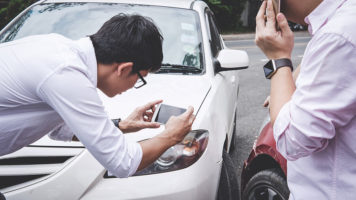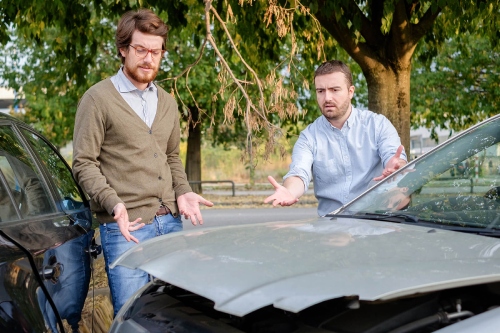Rear-end accidents are generally clear cases of liability. Typically, the driver who rear-ends another vehicle is the responsible party, and as the responsible party, they should be liable for damages. However, in some cases, the driver of the lead car causes the accident. The facts surrounding any injury case are important. Lawyers build car accident cases fact by fact, and the facts will determine who is at fault for a rear-end accident.
After an accident, seeking compensation is necessary to improve an injured person’s position and get their life back on track. An accident victim should consult with an experienced accident lawyer to maximize settlement recovery.
The following discusses how a car accident attorney works to determine fault in a rear-end accident and what happens after an accident occurs.
Causes of Rear-End Accidents
Every driver risks getting into an accident each time they get into their vehicle and share the road with another driver. Every driver must act carefully when driving to mitigate the risk of a traffic accident. Driving carelessly is irresponsible and creates unnecessary risk for other drivers, making the reckless driver vulnerable to a lawsuit.
The causes of an accident may vary. Rear-end accidents are common. The National Highway Traffic Safety Administration suggests that of the accidents that cause severe or fatal injuries, 29 percent of those accidents are rear-ended accidents.
When a driver operates a vehicle carelessly, a rear-end accident can occur.
Here are common causes of rear-end accidents:
- Tailgating/Following too closely
- Congested or bumper-to-bumper traffic
- Speeding
- Running a red light
- Erratic lane changes
- Distracted driving
- Fatigued driving
There are also circumstances where the so-called lead driver (the rear-ended driver) is at fault for the rear-end accident.
Examples of when a lead driver is responsible for a rear-end accident include:
- Improper braking or brake-checking.
- Failing to obey traffic signals
- Improper lane change
- Failing to use indicator lights
- If a third vehicle pushes the lead vehicle from behind in these situations, the lead vehicle driver may bear some responsibility for damages to the third vehicle.
The insurance company will ultimately make a liability decision. If an accident victim disagrees with the insurance company’s determination, they may consider hiring an accident lawyer to represent them. The benefits of having an accident attorney include having an experienced advocate speak to the insurance adjuster and help the accident victim negotiate the best settlement.
If the insurance company is unwilling to offer a satisfactory settlement amount, the accident attorney can help the accident victim understand their options about filing a lawsuit. Filing a lawsuit can overwhelm anyone, especially if the injured party was never in a court case before. An accident attorney is a resource for an injured person and will answer questions that the injured person has and advocates for their best interests.
How to Prove Fault in a Rear-End Accident
The facts surrounding a case help prove the case to an insurance adjustor, jurors, or a judge. An accident lawyer and an accident victim work together to make a convincing case. Making the case starts with collecting evidence.
Collecting evidence starts at the accident scene. If an accident victim does not require immediate medical attention, they should begin collecting evidence. This begins with taking photographs of the scene. An insurance adjuster or court will want to see tire marks, damage to vehicles, and pictures of injuries.
An accident victim will also need to show dollar amounts for damages. It is essential to keep medical bills and record days missed from work and any other costs associated with treating the injury.
Having a complete medical record is very important when proving an injury case. Attend every doctor’s appointment and physical therapy visit, take doctors’ advice, take the prescribed medication, and consider surgery if the doctor recommends it.
In addition to the above, an accident victim will want to take note of the witnesses to the accident. An injured person may speak to the other driver at the scene. They may also want to talk to the other driver’s passengers. The other driver’s passengers are not obligated to speak to the accident victim. Still, if they are willing, get the passengers’ initial reactions to the accident.
Even if no one is willing to speak to the injured person, there certainly will be a discussion about the accident at the scene. It is prudent to listen to those conversations if possible. After something as jarring as a car accident happens, people are not usually on guard with their reactions. Initial impressions may be used in court to prove fault.
Anyone an accident victim speaks to about the accident is potentially a witness for trial. Accident victims usually need witnesses who can speak to how they lived, their ability before the accident, and how they changed. These testimonies can help your lawyer prove pain and suffering and long-term and short-term disability.
Collect evidence about lost wages and your inability to earn. An accident victim should keep an attendance record with the days they missed and the reason for missing work. An accident victim may no longer work at the same job. The accident victim will need to prove that they stopped performing their work duties. If a person loses their job, they will need to document why. This document will help prove the loss of ability to earn.
Consequences of a Rear-End Car Accident
Every traffic accident has the potential to cause physical injury and property damage. Many people may not think about the possible consequences of getting hurt in an accident.
Examples of physical injuries that can occur because of a rear-end accident include:
- Whiplash
- Back injuries
- Knee injuries
- Strains and sprains
- Concussion and other head injuries
- Broken bones
- Bruises
- Short-term disability
- Long-term disability
- Cuts
- Internal injuries
- Amputation
- Death
In addition to the above injuries, some non-economic damages can also occur.
Non-economic damages include harm that does not have a dollar value, but its effect may never diminish:
- Post-traumatic stress disorder (PTSD)
- Emotional distress
- Mental anguish
- Anxiety and depression
- Insomnia
- Loss of enjoyment of life
Damages also include property damage to the vehicle and lost income. Lost income consists of the lost work hours because of injuries suffered during the accident and loss of earning capacity. A person loses earning capacity if they can no longer earn money the way they did before the accident. The injured person may work and earn a living, but they may take a lower-paying job. The affected person is entitled to compensation for the loss.
What Happens After a Car Accident?
After a rear-end accident occurs, the parties involved should call the police. The police will come to the scene and speak to the drivers and passengers and any other witnesses. The police officer will collect witness statements. The officer will also observe the scene and try to understand what happened based on any physical evidence they observe, like tire marks or damage to street signs, streetlights, or surrounding vegetation.
After getting as much information collected, the officer will complete their accident report. The officer will make an initial decision regarding the fault. However, the police officer’s determination will not be the final word on responsibility. Still, the parties’ insurance companies will consider the officer’s findings in making its final determination on who is at fault for the accident.
Each driver must report the accident to their respective insurance company after an accident regardless of fault. After the drivers make the report, the insurance companies will independently investigate the facts of the accident. Once the investigation is complete, the insurance company will make a final decision regarding the fault. Insurance premiums may be raised accordingly.
After the fault is determined, the driver at fault will be responsible for paying damages to the injured party. Negotiations may take many months or years, depending on the injuries and property damage severity. Each driver must cooperate with their insurance company’s investigation, or they may see their premiums increase or policies canceled due to lack of cooperation.
In some cases, the at-fault driver’s insurance company may not willingly pay out money that the injured driver requires to recover fully. An accident lawyer uses their experience and knowledge to help accident victims get the compensation they deserve.
What Payment Arrangements Do Accident Attorneys Have Available?
Car accident lawyers are aware of victims’ concerns about the cost of legal representation. Because of this, accident lawyers often offer a contingency fee structure so that car accident victims can seek justice without breaking the bank.
According to a contingency fee agreement, an attorney and client agree that no attorney fees will be paid unless a monetary settlement agreement is reached and the client is paid. The contingency fee agreement should specify which litigation expenses should be paid at each case stage. The client and lawyer can decide whether to pay the litigation expenses upfront or wait until the case settles.
Filing fees, expert witness fees, deposition fees, and mediation fees are among the costs. A contingency fee agreement should specify if an accident lawyer requires payment of expenses in advance. A lawyer will take a reasonable percentage of the settlement amount as a fee.
An accident lawyer usually charges a contingency fee to pursue an injury claim without incurring many or any upfront legal costs. Contingency fees are not the same as traditional retainer agreements or lawyers’ hourly fees in other cases. Generally, a lawyer who accepts a contingency fee agreement begins representing a client on the condition that they will receive a percentage of the settlement amount they win. Clients benefit from contingent fees because legal fees are kept low. Regardless of the length of the case, the contingency fee stands.
Lawyers must follow specific ethical rules. Under applicable ethical rules, only certain cases can have contingency fee agreements. Typically, contingent fees are only allowed in personal injury cases. Criminal or family law matters cannot have a contingency fee structure.
Contact a Car Accident Lawyer Today

Car Accident Lawyer, Matthew D. Glenn
Accident victims can receive assistance from car accident lawyers. If someone is involved in an accident, they should hire a lawyer to represent them against large insurance companies. Claims adjusters and insurance lawyers help the insurance company get the best possible result. The insurance company’s team is likely to make an accident victim’s injuries disappear while posing little risk to them.
Going against a large insurance company or savvy defense lawyer alone can be overwhelming or intimidating. Insurance adjusters may manipulate and bully an accident victim into accepting an inadequate settlement. Accident lawyers know what arguments insurance adjusters will make to prevent accident victims from getting their deserved compensation. It is in an accident victim’s best interest to consult with a qualified accident attorney if they are in a motor vehicle accident.
It is the accident victim’s job to get well, and it is an accident lawyer’s job to deal with the insurance company to ensure the injured person can get well in peace. The right accident lawyers have the experience and knowledge necessary to settle an accident effectively. By using an accident lawyer’s services, an accident victim is not risking leaving money on the table.
A lawyer who handles accident claims can assist an accident victim in recovering damages after an accident. A lawyer is the first step in creating a team that fights as hard for the victims as the insurance companies do against them.
Working with an experienced and qualified car accident lawyer gives a rear-end accident victim their best shot when negotiating a settlement claim. An experienced car accident lawyer will protect you. Contact a qualified car accident attorney in your area as soon as possible after a rear-end accident hurts you.



